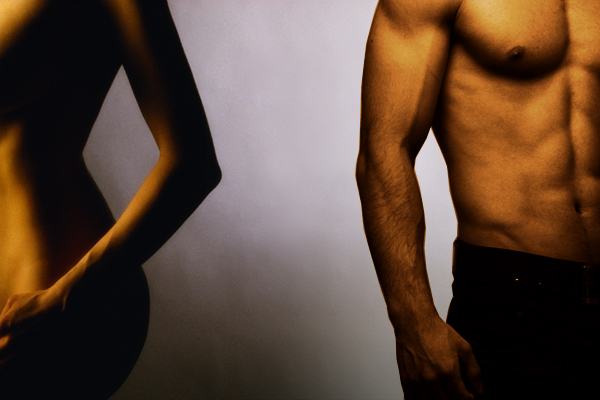The big sex news of the week was that bisexual men exist.
OK, so a new study proving that bisexual men are aroused by both men and women didn’t come as “news” to bi men, but most are nonetheless relieved by the results, because it will help to legitimize their identity in others’ eyes. (This is especially true since prior research controversially reported that there was no evidence of male bisexuality.) Still, the more than dozen bisexual men that I interviewed about the study say it serves as a reminder of just how far they still have to go toward acceptance and understanding. Despite enormous strides made in the past decade for LGBT rights, male bisexuality remains a challenging idea and a unique taboo, even within sexually progressive circles.
A large part of that is because, culturally, we tend to think in terms of black-and-white, not shades of gray — and that’s especially true when it comes to the subject of sex. Rarely does a bisexual come out without fielding questions about which sex they like more — the assumption being that they must lean one way or the other. It’s true that many do: As Ryan from Vancouver wrote in an email, he puts an “emphasis on the ‘preference’ in ‘sexual preference.'” He might be attracted to women more often than men, but believes he “could be attracted to pretty much anybody in the right circumstances, sexuality be damned.” But there are also many bi men who describe their sexual attraction in much more fluid terms. The 27-year-old says: “To me, I look for and fall in love with the personality and the intelligence, and then the overall style of the person, never giving any thought to if they are ‘male or female.'”
Romantic as it may be, that is a concept not so easily grasped by the general public — which can make bisexual men feel invisible. Simon, a 26-year-old living in Brooklyn, N.Y., tells me, “Whenever, say, some prominent heterosexually married male public figure has a same-sex affair, literally everyone rolls their eyes at the ‘closeted homosexual,'” he says. “I’m not sure I remember ever hearing someone seriously entertain the possibility that the philanderer was bisexual.” Bisexuals are more visible than ever, but our cultural default, the shortcut we take to understand a person, is still: gay or straight?
It’s amazing that this is still the case more than 60 decades after the Kinsey scale was introduced. “I think Kinsey’s work laid a more realistic foundation for examining human sexuality,” Ryan, a freelance writer, says. Even the bisexual label is problematic, because it functions “as a ‘catch-all’ for everything that isn’t 100 percent gay or 100 percent straight,” says 25-year-old Cameron of Chicago. “Human sexuality is complicated,” he says. “Accepting that is probably one of the more difficult social challenges to overcome.”
It can also present a significant internal challenge. “It’s easy to get caught up in the idea that I must be one or the other,” says Simon, the 20-something Brooklynite, which leads to self-doubt. If he has a less than inspiring hookup with a woman, suddenly the question becomes: Am I gay? If there aren’t fireworks with a man, it’s: Maybe I’m straight, after all. After so much interrogation by others, it’s only natural to begin to interrogate yourself.
Even without any genuine questions about their identity, many bisexual men end up choosing a different label, depending on the circumstances. “I am either gay or heterosexual dependent upon the company I keep,” says 49-year-old Ed. Some men identify as gay when they’re dating a man and straight when they’re dating a woman — it’s easier to go along with people’s assumptions than it is to detail the subtle nuances of one’s attractions.
The pressure to pick a side doesn’t end there. A number of the older men I interviewed reported having found women, most often bisexual women, who were turned on by their identity, but several men in their 20s said that straight women were turned off by it. “I encounter lots of women who totally rule out relationships with men who’ve slept with men,” says Simon. “It seems like straight women attach an ‘ick’ factor to bisexual men that straight men don’t attach to bisexual women.”
That’s an area ripe for further research, but it seems likely that the “bi now, gay later” stereotype, and the perceived link between HIV and gay sex, might be factors. It doesn’t help any that masculinity is so often equated with both heterosexuality and homophobia. For this reason, some bisexual men who are primarily attracted to women report that they identify as straight on dating sites. One bi man observed that “bisexual women seem to be the ‘holy grail’ of sexuality,” especially in the straight world, but bi guys aren’t fetishized to anywhere near the same degree.
The resistance to bisexuality doesn’t just come from the fact that it requires shades-of-gray rather than black-or-white thinking. It also implicitly raises the possibility that we’re all much more intricately sexually wired than we like to admit. Male bisexuality poses an even greater threat: The stakes of being “a little bit gay” are so much higher for men than for women.


